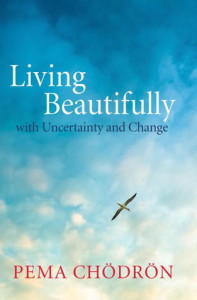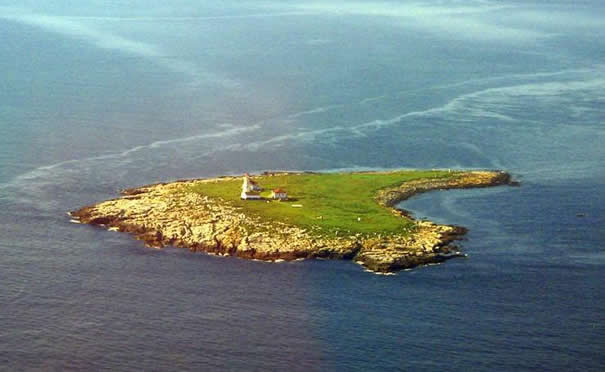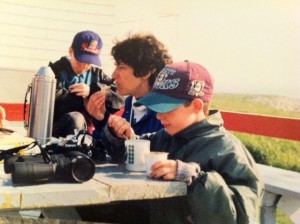When my son, Colin, was three years old he realized he was going to die. He wasn’t sick, and we had never talked about death. He just walked up to me one day and said, “When I die, some boy will get all my toys.” No drama, simply an acknowledgement. I, on the other hand, wanted to fall to my knees and weep at his loss of innocence. Instead I said, “You’re not going to die for a long, long time.” He looked at me as if I didn’t quite get it, and went back to his room. I went outside to hang the clothes on the line. A few minutes later he stuck his head out his bedroom window and said, “Now, mom?”
This shows two things:
- Time is relative – a long time to a three-year-old is the time it takes to unfurl a piece of laundry.
- We would rather wring out ten loads of laundry by hand than talk about death.
Our impermanence is like the white elephant in the middle of the room. We walk around it, over it, exclude it from conversations and banish it from the dinner table. What if we embraced it? Admittedly, a white elephant, or any elephant for that matter, is tough to get your arms around. But what if we at least acknowledged its presence? Or maybe warmed up to it gradually by spending time with its cousins, uncertainty and groundlessness?

We might be happier. Saner. Less afraid. We might even find ourselves more fully alive, as counter-intuitive as this seems. In her latest book, Living Beautifully with Uncertainty and Change, Buddhist nun Pema Chodron challenges us to stop clinging to the shore, to abandon our patterns and habits and throw ourselves into the river of life without a buoyancy compensator. (I did this in real life once and almost drowned. But that’s another story.)
Perhaps the water analogy is what made this concept resonate with me. Pema begins her book with a quote from Shunryu Suzuki Roshi: “Life is like stepping into a boat that is about to sail out to sea and sink.”
I’ve been on that boat. The one that’s sailing out to sea and sinking. It was a lobster boat sailing from Seal Harbour to Machias Seal Island. Machias is a bird sanctuary managed by the Canadian Wildlife Service. It’s a 20-acre flat and treeless piece of rock stranded in the Gulf of Maine and it’s the breeding grounds for more than 3,000 pairs of puffins, among other species. A remote summer home to be sure, but that’s the way the birds like it. And to keep it that way the Wildlife Service limits the number visits to the island, licensing only a few operators to make scheduled landings.

Machias Seal Island
Our charter left early one mid-August morning with ten of us – artists, photographers, bird-watchers, naturalists and hybrids, like me. We stashed our backpacks under benches in the back of the boat, jostling for seats in a vessel designed for work, not comfort. The Bay was grey and churning. As a recreational diver I knew how unpredictable the Fundy could be, and I had a framed map of shipwrecks around Grand Manan to remind me. I snuggled my two boys closer and settled in for our 20-km trip, and the rare chance to come face-to-face with some of the most fascinating birds on the planet.
Just as we lost sight of Southwest Head, the last point of land, the sea grew choppy. Throwing-up-over-the-side-of-the-boat choppy. White faces, white knuckles gripping the gunnels. Some of the children were crying. I couldn’t stop thinking, Why have I put my boys at risk? I grew up on the ocean. I know better. The boat rocked and shuddered. My children sat very still and quiet, eyes wide, wary, as if (was it my imagination?) they didn’t quite trust my judgment.
I couldn’t bear it. Finally, I took them by the hand to the front of the boat and knocked on the cabin door. The captain let us in. It was cramped. Colin and Patrick clung to me like barnacles. The captain looked grim (my imagination again?). We both stared straight ahead into the spray. I braced myself.
And then a funny thing happened. Once I stared the sea in the face, I started feeling my feet beneath me, solid even as the floor swayed. I became giddy, exhilarated as wave after giant wave broke over the bow. I wanted to shout, Is that all you’ve got? Crash! Let’s see another one. Bigger! More! Sitting in the stern had made it all seem terrible and hopeless. But up here I was fully alive!
That’s one of the things Pema is saying, I think. Whether you’re cowering in the stern or toughing it out on in the bow, you could still sink. But accepting your situation as it is sets you free.
The storm passed, as all things do. And after a few hours, a lighthouse emerged from the mist. We heard Machias before we saw it – a cacophony of screeching, shrieking birds. We climbed out of the lobster boat into a tender, putt-putting our way past seals stretched out on rocky chaise lounges. It was low tide, so the rowboat pulled up to the seaweed-slick ledges and let us out.
The children forgot their fear of the sea, preoccupied as they were with protecting themselves from being dive-bombed by Arctic terns. The enforcement officer had given us sticks to hold over our head. When the terns swooped down with their pointy bills, the sticks, being the highest point, took the hit.

Lunch on Machias Seal Island with Colin (seated). Before he became an ultrarunner.
We spent three hours on the island, much of it in blinds, amazed by the array of wildlife and the chaos generated by thousands of birds on such a tiny piece of land.
In the last chapter of her book, Pema quotes the meditation master, Chogyam Trungpa who says, “Chaos should be regarded as extremely good news.” That’s easy to see on Machias Seal Island (once you get there!) but much harder to appreciate when we’re in the throes of it. Yet, facing life squarely and accepting it exactly as it is, without trying to hide from it (because, really, there is nowhere to hide) allows us to live fully in even the most difficult times.
As for my oldest son, Colin, the one who glimpsed his mortality at three? He now runs 80-km races through the wilderness, in the dark with only a headlamp, some food and water. Patrick takes on extreme physical challenges almost daily (think tire pulls and 30-minute wall sits). They’ve grown comfortable with discomfort. I believe Pema would agree with me that the boat trip to Machias Seal Island had something to do with it.
And me? I traded in my diving gear for a writing career, as unpredictable as the Bay of Fundy, which also requires letting go of the shore. And the deeper I go the more frightening and rewarding the journey becomes.

I so love to hear of other people’s physical challenges met and survived since I put myself out there so little. I do think you set your children off on a life of physicality that has stood them well. Riding the waves of rough seas or sliding sideways on a sail boat (remember?) is a good metaphor for allowing ourselves to be vulnerable as writers and people. Love this story.
I remember the sail to Block Island very well! Fabulous until we got seasick. Come to think of it, going to an island forces you to let go of the shore! I agree that staying with experience is the best way to get through it when it’s tough, and to enjoy it when it’s good, even when you know it may be fleeting. Thanks so much for your kind and insightful comments, Mary.
Great piece. I found the discussion of ceasing to cower in the stern, and feeling one’s feet beneath one when “toughing it out on the bow”, particularly telling. Of course, I read this, as I am sure it was intended, as metaphorical, and immediately saw its relevance to engaging in political action. Now I’m working on applying the metaphor of the pointy sticks!
Thanks so much, Berkeley. So pleased you’ve found my blog! In politics, it may also be less risky to take a stand than to take a back seat. As for the pointy sticks, they may protect birdwatchers but I don’t think there’s anything that keep a politician from being shit on ;)
Loved reading this. So much to embrace.
Thanks, Susan. I’m happy you enjoyed it!
Hi Cathy and thanks for the essay on letting go. Makes me think of the ‘fierce urgency of now’ speech. Now – now – now – what do we do with our ever-present now? It can be liberating once the ‘looking in the mirror’ moment is over. I’m keeping a ‘now’ diary as an experiment. I’ve never been able to sustain a conventional diary b/c it’s such a banal read after the fact. The ‘now’ diary could be interesting if it doesn’t get too self-aware. . . more later on this topic!
“Now” diary – fascinating! I wonder what too self-aware would look like….
Wonderful piece of writing, Kathy.
Thanks, Barb! I hope you had fun with NaNoWriMo!
I mean Cathy……
Once again, your writing, picks me up, perks me up, puts me in a wonderful frame of mind. After reading your blog this morning, I felt compelled, to google “what is good writing”, quickly finding a quote that so accurately describes you and your writing. ” We value writing because it reveals the personal choices a writer has made and thereby reveals something of her habits of mind, her ability to connect and shape ideas, and her ability to transform or change us as readers.” I love your writing Cathy, and anxiously await for each new piece.
Carolyn, you blow me away. Writers flounder ‘out here’, not really know what we’re doing, but hoping that it has value and that revealing ourselves is worth the risk. This kind of validation and reassurance is what keeps this writer, at least, going. Thank you for being an amazing friend and brilliant reader. xox
I truly enjoyed the story of the trip and the and the life lessons revealed. Though not having done that particular trip in a lobster boat, I can relate it to others I have taken. It is also fun to hear of true experiences that I know are true. They are always better than anyone could make up – are they not?
Keep on writing – Big Brother
Thanks very much, Ken! You have many stories you could tell about being above, below and on the water :) It’s interesting you should say that about true stories being better – I’ve spent a lot of years struggling with fiction but real life kept coming in and taking over the stories. In fact, a creative writing instructor advised me to take out most of the incidents in my short story because no one would believe them. I said, “But they’re true!” He said, “That doesn’t matter, they’re still unbelievable.” Since I’ve taken the creative non-fiction route, writing has become much more enjoyable. I’ll keep writing, and it’s reassuring to know that Big Brother is watching ;)
dear cathy:
what took me so long. now i am here i won’t be going anywhere. leaving the shore so spare and telling. you mentioned poems. but not sure where they are.
marilyn
Thanks, Marilyn!
I loved this! I’m buying the book! What a great story to share with great insight!
Thank you! I think you’ll love the book!
Visiting Machias Seal Island Another thing in common, I visited that beautiful island in July 1972 and was also dive bombed by terns!
I very much enjoyed reading about your visit with your two sons.
Thank you, Jake!